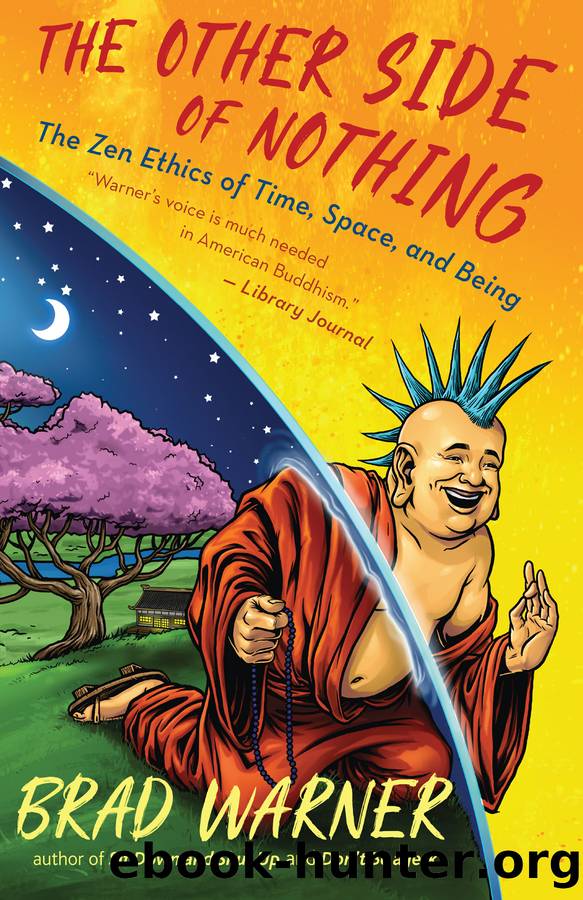The Other Side of Nothing by Brad Warner

Author:Brad Warner
Language: eng
Format: epub
Publisher: New World Library
Published: 2022-03-14T00:00:00+00:00
25. I VOW TO REFRAIN FROM INTOXICANTS
THE BODHIDHARMA ONE-MIND Precepts version of the precept about not using intoxicants goes, âSelf-nature is mysteriously profound. In the truth of original basic purity, not to give birth to ignorance is called âno selling wine, no drinking wine.â â
As you may have guessed from that, another version of this precept is âNo selling of wine, no drinking of wine.â Another version is âDonât live by selling liquor.â
Nishijima Roshi, commenting on the version that says not to live by selling liquor, says, âThis seems rather strange as a religious precept. I feel that the original concept might have been not to drink liquor. Perhaps as Buddhism spread from India to countries like China and Japan this precept was altered to suit local conditions. In those northern countries alcohol was considered an important aid to survival during the cold winter months. So personally I feel that it is important not to drink, but we should recognize the precept in the form that it has come to us from the past.â
Some of the variations on this precept in English include, âA disciple of the Buddha refrains from taking or offering harmful intoxicants or drugs that delude body/mindâ (Shunryu Suzuki), âA follower of the way does not intoxicate oneself or othersâ (Dainin Katagiri), and âNot to cause others to use liquors or drugs that confuse or weaken the mind and not to do so oneself, but to keep the mind clearâ (Philip Kapleau).
The ever-reliable Diane Eshin Rizzetto has a wordier version that goes, âI take up the way of cultivating a clear mind. Fear holds the cup and I hide in the distortion of its shadow. The cup falls and sunlight blinds with painful brightness. I vow to stand with empty hands, tight chest, trembling, and tears. I vow to stand with eyes open to what is revealed. Who drops the cup?â
Ummm. OK, then!
Moving right along, the Brahmajala Sutra says, âA disciple of the Buddha must not trade in alcoholic beverages or encourage others to do so. He should not create the causes, conditions, methods, or karma of selling any intoxicant whatsoever, for intoxicants are the causes and conditions of all kinds of offenses. As a Buddhaâs disciple, he ought to help all sentient beings achieve clear wisdom. If instead, he causes them to have upside-down, topsy-turvy thinking, he commits a major offense.â
Furthermore, abstaining from intoxicants can be a gift to others. The Buddha put it this way, âFurthermore, in abstaining from taking intoxicants, a disciple of the Buddha gives freedom from danger, animosity, and oppression to limitless numbers of beings. In giving freedom from danger, animosity, and oppression to limitless numbers of beings, he gains a share in limitless freedom from danger, animosity, and oppression.â When you donât get drunk or high, the rest of us donât have to deal with your drunk/high ass annoying us or crashing your car into us.
Pretty much everyone agrees that, even though the Chinese character for alcohol appears in this precept, it applies to all forms of intoxicants.
Download
This site does not store any files on its server. We only index and link to content provided by other sites. Please contact the content providers to delete copyright contents if any and email us, we'll remove relevant links or contents immediately.
| Philosophy | Spirituality |
The Way of Zen by Alan W. Watts(6595)
Ego Is the Enemy by Ryan Holiday(5412)
The Art of Happiness by The Dalai Lama(4121)
The Book of Joy by Dalai Lama(3971)
Why Buddhism is True by Robert Wright(3446)
Spark Joy by Marie Kondo(3296)
Shift into Freedom by Loch Kelly(3192)
Happiness by Matthieu Ricard(3040)
A Monk's Guide to a Clean House and Mind by Shoukei Matsumoto(2901)
The Lost Art of Good Conversation by Sakyong Mipham(2639)
The Meaning of the Library by unknow(2564)
The Unfettered Mind: Writings from a Zen Master to a Master Swordsman by Takuan Soho(2294)
The Third Eye by T. Lobsang Rampa(2256)
Anthology by T J(2204)
Red Shambhala by Andrei Znamenski(2191)
The Diamond Cutter by Geshe Michael Roach(2058)
Thoughts Without A Thinker: Psychotherapy from a Buddhist Perspective by Epstein Mark(2010)
Twilight of Idols and Anti-Christ by Friedrich Nietzsche(1888)
Advice Not Given by Mark Epstein(1877)
